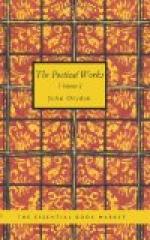[Footnote 145: ‘Simkin:’ a character of a cobbler, in an interlude.]
[Footnote 146: ‘Panton:’ a famous punster.]
[Footnote 147: ‘Decker:’ Thomas Decker, a dramatic poet of James I.’s reign.]
[Footnote 148: ‘Worlds of Misers:’ ‘The Miser’ and ‘The Humourists’ were two of Shadwell’s comedies.]
[Footnote 149: ‘Raymond’ and ‘Bruce:’ the first of these is an insipid character in ‘The Humourists’; the second, in ‘The Virtuoso.’]
[Footnote 150: ‘Ogleby:’ translator of Virgil.]
[Footnote 151: ‘Herringman:’ Henry Herringman, a bookseller; see ‘Life.’]
[Footnote 152: ‘Love’s Kingdom:’ this is the name of the only play of Flecknoe’s, which was acted, but miscarried in the representation.]
[Footnote 153: ‘Virtuoso:’ a play of Shadwell’s.]
[Footnote 154: ‘Gentle George:’ Sir George Etheredge.]
[Footnote 155: ‘Alien Sedley:’ Sir Charles Sedley was supposed to assist Shadwell in writing his plays.]
[Footnote 156: ‘Epsom prose:’ alluding to Shadwell’s play of ’Epsom Wells.’]
[Footnote 157: ‘Formal:’ a character in ‘The Virtuoso.’]
[Footnote 158: ‘Nicander:’ a character of a lover in Shadwell’s opera of ‘Psyche.’]
[Footnote 159: ‘Wings and altars:’ forms in which old acrostics were cast. See Herbert’s ‘Temple.’]
[Footnote 160: ‘Bruce and Longville:’ two characters in Shadwell’s ‘Virtuoso.’]
* * * * *
BRITANNIA REDIVIVA:
A POEM ON THE PRINCE, BORN JUNE 10, 1688.
Our vows are heard betimes! and Heaven
takes care
To grant, before we can conclude the prayer:
Preventing angels met it half the way,
And sent us back to praise, who came to
pray.
Just on the day, when the high-mounted
Sun
Did furthest in his northern progress
run,
He bended forward, and even stretch’d
the sphere
Beyond the limits of the lengthen’d
year,
To view a brighter sun in Britain born;
That was the business of his longest morn;
10
The glorious object seen, ’twas
time to turn.
Departing Spring could only stay
to shed
Her bloomy beauties on the genial bed,
But left the manly Summer in her stead,
With timely fruit the longing land to
cheer,
And to fulfil the promise of the year.
Betwixt two seasons comes the auspicious
heir,
This age to blossom, and the next to bear.
Last solemn Sabbath[161] saw the
Church attend,
The Paraclete in fiery pomp descend;
20
But when his wondrous octave[162] roll’d
again,
He brought a royal infant in his train.
So great a blessing to so good a king,
None but the Eternal Comforter could bring.




